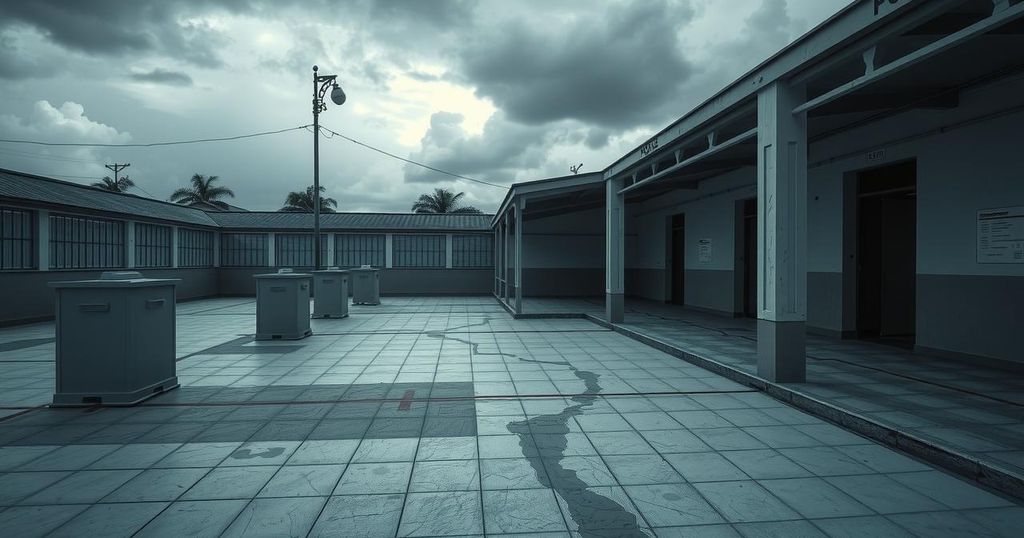Maduro’s Party Poised for Major Victory as Opposition Boycotts Elections
Venezuela prepares for legislative and regional elections with Maduro’s party expected to win amid a boycott by opposition groups. Key figures, including Juan Pablo Guanipa, have been arrested, highlighting tensions. Despite over 21 million eligible voters, turnout is projected at only 16%, as many citizens express distrust in the electoral process following past controversies. The situation is further complicated by U.S. sanctions affecting oil revenues.
Venezuela is bracing for significant political maneuvers as President Nicolas Maduro’s party anticipates a considerable victory in the legislative and regional elections on Sunday. This scenario unfolds amid a wave of arrests targeting opposition figures who have called for a boycott, criticizing Maduro’s controversial reelection last year. The prominent opposition group, led by Maria Corina Machado, has urged voters to abstain from the polls to protest what they deem a fraudulent electoral process.
Rumors and allegations have swirled around the country as Juan Pablo Guanipa, a notable member of the opposition, was arrested ahead of the elections on dubious charges linking him to a supposed “terrorist network” aiming to disrupt electoral proceedings. Interior Minister Diosdado Cabello further stirred the pot by connecting Guanipa to a group captured earlier in the week, accused of being mercenaries backed by foreign interests. Caracas has positioned the arrests within its narrative of stemming foreign interference.
In a preemptive move, Venezuela has shut its border with Colombia, citing the need to maintain security. Sunday’s atmosphere was thick with tension, marked by the deployment of over 400,000 security personnel around polling stations. Eligible voters amount to approximately 21 million, who were set to choose from 285 members of the National Assembly and 24 governors, including positions in the contested Essequibo region.
However, polls suggest a dismal turnout, with projections hinting at only 16%. This bleak forecast follows rampant allegations of electoral fraud after last July’s presidential vote—wherein Maduro was swiftly proclaimed the victor despite the absence of detailed results. A subsequent opposition tally indicated a strong lead for candidate Edmundo Gonzalez Urrutia, who has since sought asylum abroad. The violent crackdown on post-election protests has deepened global skepticism regarding Venezuela’s political landscape.
Maria Corina Machado has characterized the elections as an “enormous farce.” In a demonstration of her claims, she shared photographs of largely unoccupied polling stations on social media platforms. Reports from various polling locations echoed this narrative of voter apathy, with few citizens appearing to participate. For example, a retired civil servant lamented that her previous voting experience felt fraudulent, leading her to abstain yet again.
Polls closed at 6:00 pm local time after a morning marked by divided sentiments. Some, including a faction led by Henrique Capriles, rejected the boycott, instead advocating for participation as a form of resistance. Capriles encouraged citizens to view voting as a stand against oppression, stating, “We must vote as an act of resistance, of struggle.”
Recent developments may jeopardize Maduro’s oil-dependent regime further. The U.S. has blocked oil giant Chevron from continuing operations in Venezuela and revoked protections for many Venezuelan migrants residing in the country. As the elections unfold, the focus is particularly on the competitory elections for the National Assembly and the state governorship of Essequibo—a region long administered by Guyana but still claimed by Caracas. Speculation around these elections adds an additional layer to an already complex situation.
As Venezuela navigates a politically charged atmosphere, the anticipated victories for Maduro’s party loom over a backdrop of significant dissent and unrest. The opposition’s boycott call, coupled with arrests of key figures, paints a picture of a regime under pressure yet resolute in maintaining its grasp on power. With concerns over electoral legitimacy and U.S. sanctions further complicating matters, the outcome of these elections will likely reverberate well beyond Venezuela’s borders.
Original Source: www.bryantimes.com




Post Comment